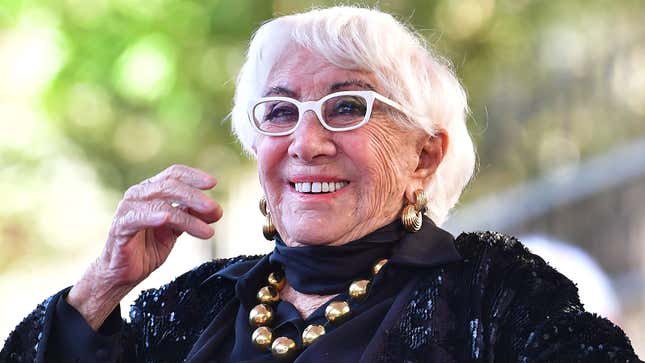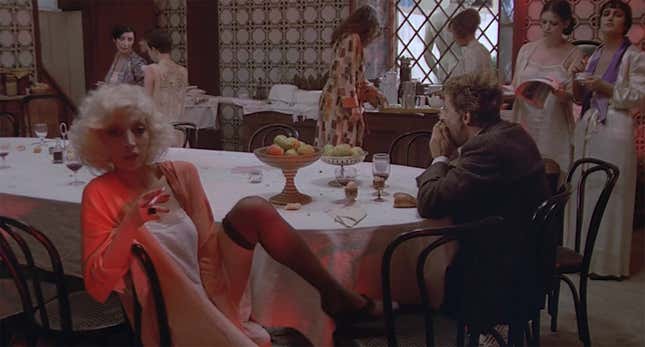The Visionary Director Who Laughs at Convention
In Depth
Photo: Frederic J. Brown/AFP
The logline on Italian arthouse cinema writer-director Lina Wertmüller’s mark on her medium is that she was the first woman to be nominated for an Academy Award for Best Director. She was alone in the designation from 1977 to 1994, when Jane Campion was up for The Piano. But to frame the honor solely in terms of identity flattens the achievement of getting such a multivalent, challenging, and utterly, absurdly surreal film to be accepted by the establishment. 1975’s Pasqualino Settebellezze (Seven Beauties was its U.S. release title) follows an Italian World War II soldier who flees the army, is captured by Germany, and placed in a concentration camp where his torture is depicted in harrowing and bleak detail. It also features a scene in which a corpse’s incessant farting distracts its protagonist from dismembering it. Gallows humor gained a few more planks the day Wertmüller committed to film. It is a movie that, in the words of New York magazine critic John Simon, “makes nonsense of the very need for classification.”
It had that much in common with its creator, who refused to be pigeonholed. “We are directors, not female directors. It doesn’t make sense to me to mark differences between men and women filmmakers. The question is to make good movies,” she told Lenny Letter in 2017. In the 2015 documentary about her life and work, Behind the White Glasses, Wertmüller described the competing sensibilities that made her movies so intoxicating in their ability to remain beguiling, scene for scene: “I found within myself two facets, two souls that coexist: the lighthearted one that was associated with musical comedies, and the socially-conscious one that was associated with musical theater. These two souls are at the core of my nature.”
The harsh and verbose films of Wertmüller’s imperial phase—generally agreed to run from 1972’s Mimì metallurgico ferito nell’onore (The Seduction of Mimi) to 1975’s Pasqualino Settebellezze—could have only happened in the ’70s. It was a time that respected furious individualism and obtuse musing that could be informed and highly literate without resorting to didacticism. Wertmüller’s characters—small-time mobsters, sex workers, self-styled revolutionaries, bourgeois tyrants—embodied the idea that the political was personal while rarely serving as role models. Wertmüller, who is alive today at 92 and hasn’t made a movie since 2004’s Too Much Romance… It’s Time for Stuffed Peppers, was more interested in politics as they were practiced than she was in venerating them. Her movies frequently portrayed ideals failing people and people failing their ideals. She called herself a “terrified optimist” and identified as a socialist. “Ideology must not devour, but illuminate art,” she told New York. “Man in disorder,” via a line from Pasqualino Settebellezze, was one of her onscreen preoccupations.-

-

-

-

-

-

-

-

-

-

-

-

-

-

-

-

-

-

-

-

-

-

-

-

-

-

-

-

-

-

-

-

-

-

-

-

-

-

-

-









































